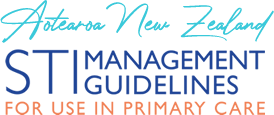STI guidelines: Māori Sexual Health Framework
These guidelines are supported by a framework that is committed to improving health outcomes and achieving health equity.
This draws from high level principles reflected in key policies and conventions focusing on Māori rights to enjoy good sexual and reproductive health. Within an Aotearoa New Zealand context, te Tiriti o Waitangi provides a fundamental basis for ensuring Māori experience equitable health outcomes.
An ongoing commitment to te Tiriti o Waitangi partners well with local support for international Indigenous health and wellbeing policy instruments, including the United Nations Declaration on the Rights of Indigenous Peoples.
The New Zealand Sexual Health Society (NZSHS) demonstrates an ongoing commitment to te Tiriti o Waitangi and international Indigenous health and wellbeing conventions through 2 primary mechanisms, including:
- A commitment to te Tiriti o Waitangi, solidified through the inclusion of a specific clause within the NZSHS constitution describing how the principles of te Tiriti can be actioned to support Māori rights to enjoy good sexual health in Aotearoa New Zealand.
- Endorsement of the ‘Aotearoa Statement on closing the gaps on sexually transmitted infections (STIs), and bloodborne viruses among Indigenous peoples of Australasia’.
The principles included in the NZSHS constitution are mirrored in the Ministry of Health framework, Whakamaua - Te Tiriti o Waitangi, acknowledging the origin of these principles, namely Wai 2575 and the Hauora Report. The principles are listed below along with summary descriptions:
- Tino Rangatiratanga: Providing for Māori self-determination and mana motuhake in the design, delivery and monitoring of health and disability services. Within the NZSHS constitution, tino rangatiratanga is not presented as a separate principle. Tino rangatiratanga is included as part of other principles (i.e. Active Protection). The description of tino rangatiratanga presented here is taken from the Ministry of Health Māori Health Action Plan 2020-2025.
- Partnership: Partnering with Māori based on equal power relationships, including the ability for Māori to retain autonomy, where Māori expressions and understandings of health and wellbeing directly influence decision making.
- Active Protection: Arising from the principle of partnership, active protection means ensuring that Māori tino rangatiratanga – with regard to having the right to decision making power – is protected.
- Equity: Equal standards of treatment applied to all populations can still produce inequitable outcomes. Equity is more than a focus on reducing inequalities or reducing disparities. Equity is a call to action where health needs are met with adequate, targeted responses.
- Options: The principle of options is jointly sustained by the principles of active protection, partnership, and equity. Māori have the right to exercise tino rangatiratanga, including choosing from a range of healthcare options that include well-resourced kaupapa Māori programmes and services.
These principles, along with the Aotearoa Statement, demonstrate NZSHS’s commitment to ensuring that Māori health gain is achieved through a strengths-based approach centred on rangatiratanga (authority, ownership, leadership), and mana motuhake (self-determination, authority). The definitions of rangatiratanga and mana motuhake presented here are taken from the Health and Disability System Review (2020, p.38).

